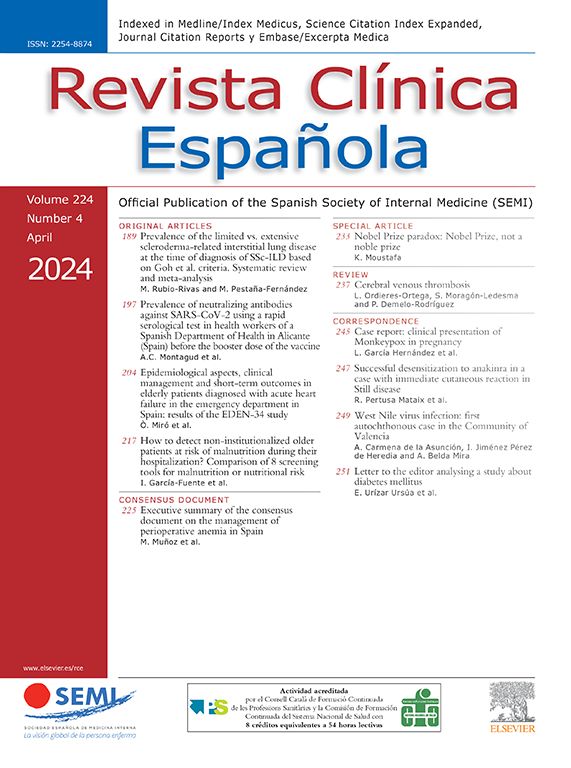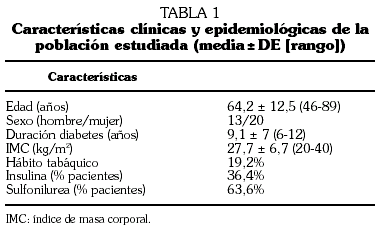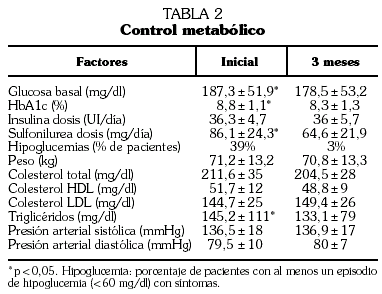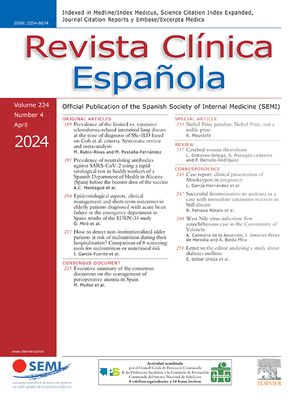Objetivo. El miglitol pertenece al grupo de los inhibidores de las alfaglucosidasas, habiendo demostrado en diferentes estudios su utilidad en la mejoría del control glucémico en diferentes poblaciones de pacientes diabéticos. El objetivo de nuestro trabajo fue analizar la utilidad del miglitol en el control glucémico y lipémico en un grupo de pacientes con diabetes tipo 2 tratados con sulfonilurea e insulina, con mal control glucémico. Pacientes y métodos. Se estudió una población de 33 pacientes con diabetes mellitus tipo 2 tratados con sulfonilureas e insulina con mal control glucémico (HbA1c > 7,5%). Todos los pacientes fueron tratados con miglitol durante tres meses con una pauta ascendente, la primera semana 50 mg dos veces al día, posteriormente durante un mes 50 mg tres veces al día. Al inicio del estudio y a los tres meses se midieron las siguientes variables; peso, talla, índice de masa corporal (IMC), presión arterial sistólica y diastólica, HbA1c, número de hipoglucemias periféricas, glucosa basal, albuminuria, colesterol total, colesterol LDL, colesterol HDL y triglicéridos, así como transaminasas (GOT, GPT, gama-GT y bilirrubina). Resultados. La edad media fue de 64,1 ± 12,5 años, con una duración de la diabetes mellitus de 9,1 ± 7 años. La media de IMC fue de 27,7 ± 6,9 kg/cm2. Se detectó una disminución de la glucosa de un 4,8% y de la HbA1c de un 5,8% (p < 0,05). Existió una disminución en el número de hipoglucemias (39,4% trimestre previo frente a 3% trimestre con miglitol). También disminuyó la dosis de sulfonilureas que precisaron los pacientes (86,2 ± 24,3 mg/día frente a 64,6 ± 21,9 mg/día; p < 0,05) (25%). Los niveles de colesterol total, colesterol HDL y colesterol LDL no se modificaron; sí se detectó una disminución de los niveles de triglicéridos (145,2 ± 111 mg/dl frente a 133,1 ± 79 mg/dl; p < 0,05) (8,3%). Un 15% de los pacientes presentaron efectos secundarios (molestias digestivas), que desaparecieron a las dos o tres semanas de iniciar el tratamiento. Conclusiones. El miglitol es un fármaco útil en mejorar el control glucémico en pacientes diabéticos tipo 2 tratados previamente con otra terapia y con mal control. Los efectos secundarios son escasos y transitorios.
Palabras clave:
miglitol, diabetes mellitus tipo 2
Objective. Miglitol belongs to the group of the inhibitors of the alpha-glucosidases and in several studies has demonstrated its usefulness in the improvement of the glycemic control in the different types of diabetic patients. The goal of our study was to analyze the usefulness of miglitol in the blood glucose and lipid control in a group of patients with diabetes type 2 treated with sulfonylureas and insulin, with insufficient glycemic control. Patients and methods. A group of 33 patients with diabetes mellitus type 2 treated with sulfonylureas and insulin and with insufficient glycemic control (HbA1c > 7.5%) was studied. All patients were treated with miglitol during 3 months with progressive doses: the first week 50 mg twice a day, subsequently and during one month 50 mg three times a day. At the beginning of the study and up to three months the following variables were measured; weight, height, BMI (body mass index), systolic and siastolic blood pressure, HbA1c, number of episodes of peripheral hypoglycemia, basal glucose, albuminuria, total cholesterol, LDL-cholesterol, HDL-cholesterol and triglycerides, as well as transaminases (GOT, GPT, gamma GT and bilirrubin). Results. The median age was 64.1 ± 12.5 years, and the median lenght of diabetes mellitus was 9.1 ± 7 years. The median value of BMI was 27.7 ± 6.9 kg/cm2. The blood glucose and HbA1c values decreased 4.8% and 5.8%, respectively. A decrease in the number of hypoglycemia episodes (39.4% previous quarter versus 3% quarter wih miglitol) was observed. Also decreased the dose of sulfonylureas needed by the patients (86.2 ± 24.3 mg/day versus 64.6 ± 21.9 mg/day; p < 0.05) (25%). Total cholesterol, HDL-cholesterol, and LDL-cholesterol levels were not modified, but indeed a reduction of the levels of triglycerides (145.2 ± 111 mg/dl versus 133.1 ± 79 mg/dl; p < 0.05) (8.3%) was detected. Fifteen percent of patients showed side effects (digestive discomfort) that disappeared two or three weeks after beginning the treatment. Conclusions. Miglitol is a useful drug in order to improve the glycemic control in diabetic type 2 patients treated previously with other drugs and with insufficient control of the blood glucose. Its side effects are limited and transitory.
Keywords:
miglitol, diabetes type 2









